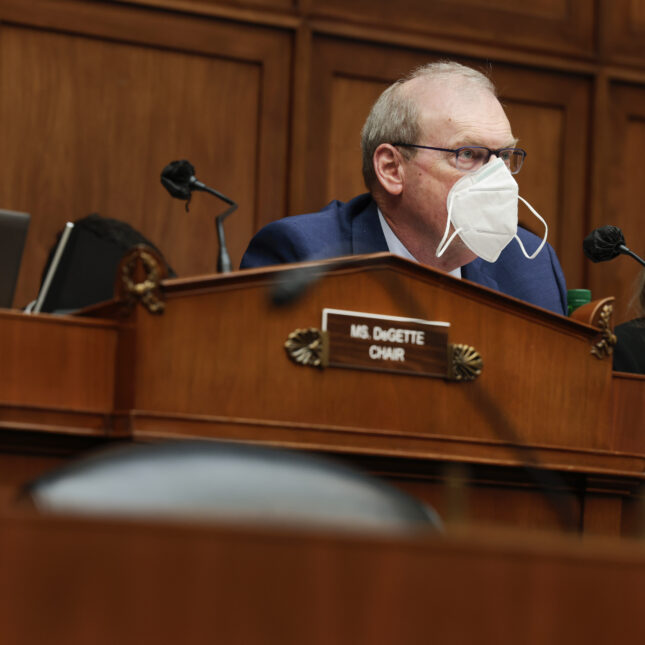
WASHINGTON — Republicans aren’t impressed with the Centers for Disease Control and Prevention’s reorganization plan, or its efforts to explain it.
The embattled public health agency late Tuesday sent answers to a set of GOP lawmakers’ questions on its “Moving Forward” reform, announced last spring amid building criticism of its Covid-19 response. The agency in February announced a reorganization plan that would eliminate 20 offices and add 16 new ones and has shared summary reports from its internal review, but not shared staff or external groups’, much to Republicans’ chagrin.
In a copy of the four-page response obtained by STAT, Melanie Egorin, Health and Human Services’ assistant secretary for legislation, denied that the restructuring was a “large-scale” change and said “this effort was not executed behind closed doors.”
Egorin also pushed back on the charge that the reorganization would give the director more authority, saying no functions or authorities were moved out of national centers but “shifted” to others.
“The only example in which a ‘National Center’ was impacted during this reorganization was the moving of CDC’s genomics activities from the Office of Science to the National Center for Birth Defects and Developmental Disabilities — a shift that actually moved additional responsibilities to this Center,” she wrote.
However, CDC Director Rochelle Walensky, who ordered the review, is leaving the agency at the end of this month. Wednesday’s charged hearing provided a window into the challenges facing President Biden’s reported pick to lead the agency, former federal and state health official Mandy Cohen, if she assumes the role.
The letter was an “unsatisfactory” response to Republicans’ questions about CDC’s plan, particularly as the agency asks more more money and authorities, Chair Morgan Griffith (R-Va.) said during an Energy and Commerce Oversight and Investigations Subcommittee hearing that saw Republicans and Democrats clash on who bore responsibility for public health confusion and mistrust during the pandemic, and how to fix it.
Government watchdogs are also having challenges getting answers from CDC on its Covid-19 response, an official told a House panel Wednesday.
“We do need more information,” Mary Denigan-Macauley, director of the Government Accountability Office’s public health unit, told the panel.
Lawmakers were especially at odds over whether the CDC should require more data from state and local health departments, one facet of the reform efforts that Walensky has said they need congressional support for implementing.
“I’m deeply troubled by CDCs inability to articulate any limitations on how they would or would not use this authority,” said E&C Chair Cathy McMorris-Rodgers (R-Wash.), who said she had privacy concerns. “CDC has broken the trust of the American people.”
E&C ranking member Rep. Frank Pallone (D-N.J.) pushed back on Rodgers’ comments.
“I don’t know how we can make improvements at the CDC when we fundamentally disagree on almost everything that happened during the crisis,” he said. “We look at the same data and come to totally different conclusions about what to do.”
Since assuming control of the committee earlier this year, Rodgers and other Republicans have put the spotlight on science agencies’ pandemic response and overall spending, turning their ire not just on the CDC but the National Institutes of Health and former top infectious disease official Anthony Fauci. Rodgers, Griffith, and others last week asked that one of Fauci’s deputies, a longtime pox researcher, sit for an interview on controversial pathogen research.
Meanwhile, per the recent debt ceiling agreement, Congress is clawing back an estimated $27 billion in Covid-19 funding across the federal government, including at least $1.7 billion allotted to CDC’s surveillance and vaccine work, even though it is still unclear how much of that money has been spent. The agreement also caps non-defense spending next year, meaning health agencies could see cuts to keep the government’s non-defense budget under $652 billion.
Those are mistakes, said Georges Benjamin, executive director of the American Public Health Association.
“The politicization of public health is very destructive,” he told the panel. “This yo-yo funding has to end. We put a lot of money in when something bad happens, often comes a little late, not quite enough, then take it away too quickly. … None of you would tolerate that for the Department of Defense.”











Exciting news! STAT has moved its comment section to our subscriber-only app, STAT+ Connect. Subscribe to STAT+ today to join the conversation or join us on Twitter, Facebook, LinkedIn, and Threads. Let's stay connected!
To submit a correction request, please visit our Contact Us page.